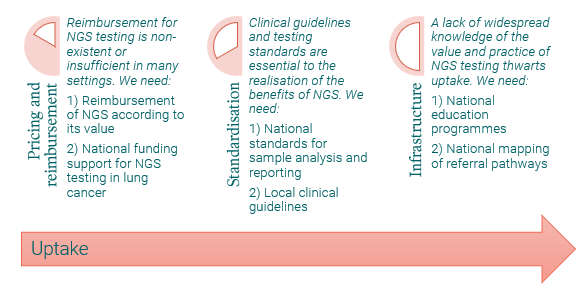In this report, we explore the status of access and uptake for NGS testing for lung cancer in Europe, develop the health economic case for NGS testing, and identify barriers and opportunities for widespread access.
Key takeaways
- Next-generation sequencing (NGS) testing for lung cancer provides more information than single gene testing and informs personalised treatment decisions, but access is variable across Europe
- The evidence shows that NGS is clinically effective, gives rise to efficiency and cost savings, and is associated with broader elements of value
- The barriers to widespread access include lack of funding, inefficient testing infrastructure, and variation in guidance
- To improve uptake, policymakers should consider i) pricing and reimbursement mechanisms, ii) standardising testing and care pathways, and iii) developing new infrastructure
Next-generation sequencing (NGS) generates comprehensive and actionable information on molecular tumour profiles. But despite recommendations for the use of NGS in lung cancer, and support for its clinical value, access is variable across Europe.
This report explores the status of access and uptake for NGS testing for lung cancer in Europe. We develop the health economic case for NGS testing and identify barriers and opportunities for widespread access to NGS testing for patients with lung cancer in Europe.
We found a wealth of evidence supporting the clinical value of NGS testing in lung cancer, with broad agreement on the mechanisms by which it can improve patient outcomes. Evidence also demonstrates the potential for efficiency and cost savings arising from the use of NGS testing. In addition to clinical and economic benefits, genomic testing is associated with broader elements of value, especially the ‘value of knowing’.
Whilst the prevailing barriers and opportunities differ across countries, we have specified three generalisable objectives and policy initiatives that can facilitate progress and increase uptake:
- The introduction of appropriate pricing and reimbursement mechanisms
- The standardisation of testing and care pathways
- The development of infrastructure
We elaborate these in a set of six actionable recommendations for decision-makers which are detailed in the full report and summarised in Figure 1 below.

Figure 1: The pathway to improved uptake of NGS for lung cancer in Europe
This consulting report, ‘The Case for Expanding Uptake of Next-Generation Sequencing for Lung Cancer in Europe’, was commissioned and funded by Takeda Pharmaceuticals America, Inc.





